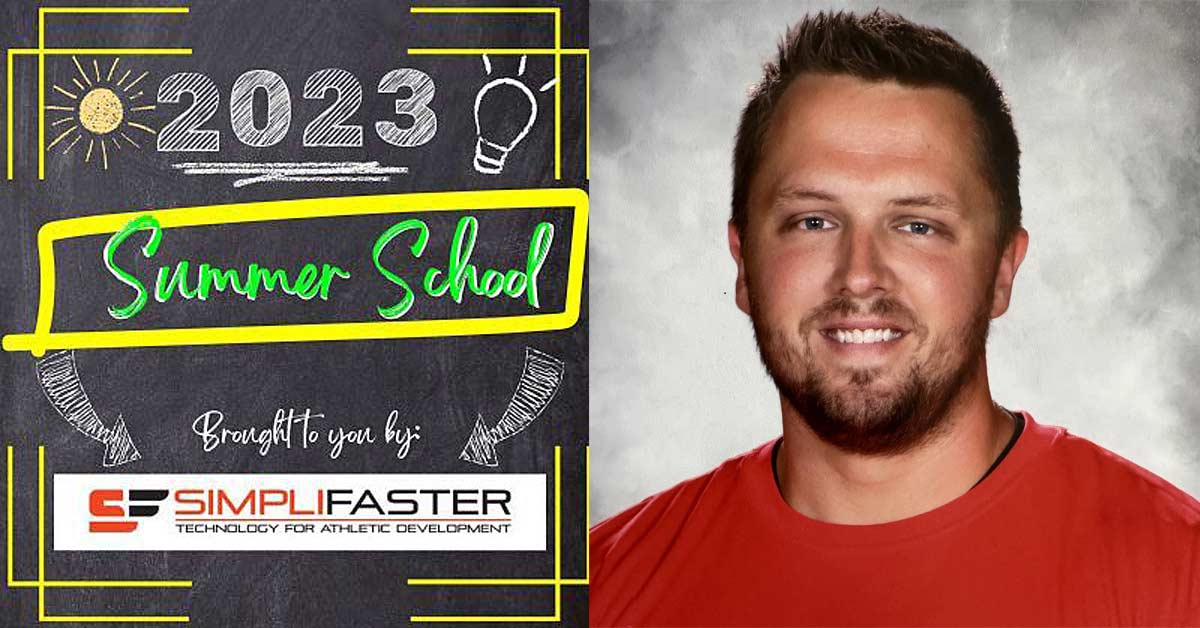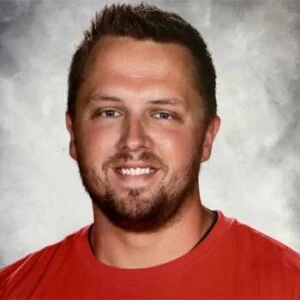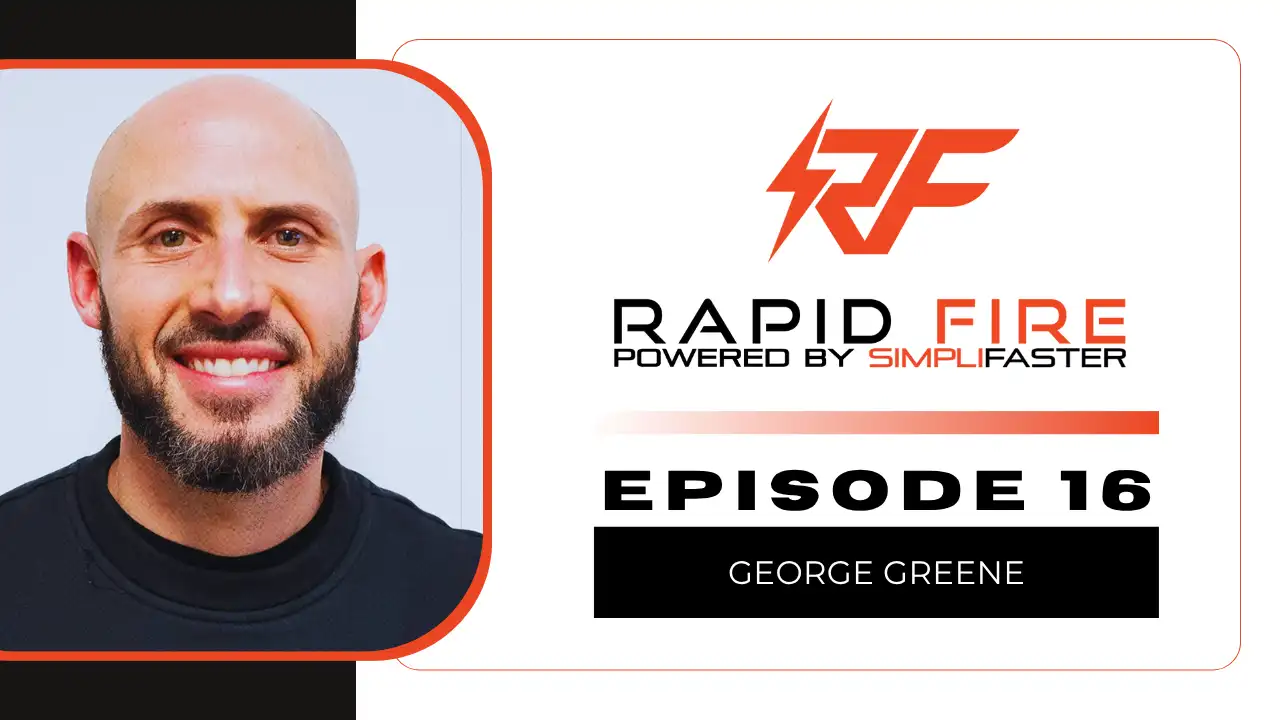Rarely in coaching does a session go precisely as planned. Whether it’s thirty extra athletes appearing out of nowhere to train, sport coaches changing times so you have to cut half of your session on the fly, or the inevitable moment when technology doesn’t work the way technology should work, performance coaches always need to be prepared to make adjustments. Week 1 of Summer School was much like a training session. Navigating a family emergency by our scheduled presenter and my lack of a voice (thanks to the first week of summer coaching), I stepped in on the spot to present, discussing the implementation of our program as I have taken over at a new high school.
This session thoroughly covers my thought process when programming in the early stages at a new school. The implementation plan included three primary goals:
- Teaching
- Assessing
- Emphasizing pace
The goal of Week One was to establish a baseline set of terminology for all coaches and athletes to understand in order to streamline our communication process. Athletes were exposed to specific drills to highlight mobility or strength-related weaknesses. These included various paused segments of our Olympic lifts, overhead squats, mobility work, and data collection that inform our KPIs. Finally, establishing an expectation of pace and movement urgency is paramount to our program. Two tiers of simple yet challenging exercises were selected to comprise the stimulus portion of our lifts. During this time, the focus was to drive the athlete’s pace between sets and movement between exercises to establish the work:rest ratios that we rely on.
This session covers my thought process when programming in the early stages at a new school, with three primary goals: teaching, assessing, and emphasizing pace, says @CoachDMullins. Share on XThe Coaches’ Card as a Tool for Organizational and Communication
During session one, we looked at my coach’s card. This is a simple document given to any coach in the weight room during our sessions to establish what will be asked of our athletes, build the session’s organization, and establish coach responsibility within the session.
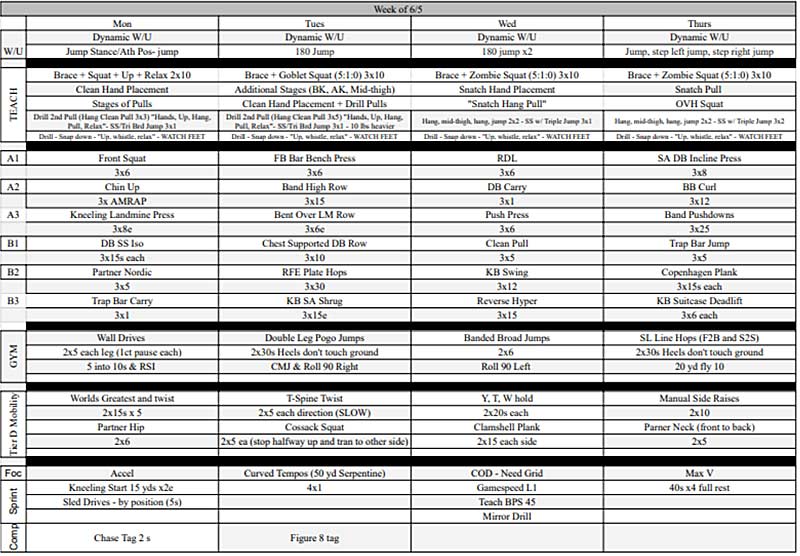
During the initial look at the coaching card, I discussed my approach when programming each session:
“My philosophy, because of my background in classroom teaching, is that I would rather have too much programmed than not enough. I find it easier to cut things on the fly than to have empty space at the end of a session with no plan to fill it.”
Briefly Sacrificing Stimulus for Teaching Time
When taking over a new program, I must teach my athletes and any coaches in the weight room, especially during the summer, my terminology and the exercises that will serve as our foundation. During this introductory period, I emphasize teaching the progressions and drilling the movements to force athletes to control the movements and maintain proper posture required to complete the exercise how they are asked to execute it. This was emphasized in session one:
“I am willing to sacrifice one of our tiers (groups of exercises) to get our teaching period in because it allows us to be on the same page from a terminology perspective so that as the summer progresses, we can more effectively communicate our plan and expectations to the entire room.”
Video 1. The full episode of Session 1 of Summer School.
Panel Q&A
Each summer school session includes a panel of three coaches who bring expert experiences from different angles. After the presenter explains their program, the panel will ask questions and provide feedback based on the constraints of the presenter’s program. This segment aims to add depth to the conversation, push into the thought process behind the programming decisions, and give insight to listeners in the refinement process.
This week’s panel members were Missy Mitchell-McBeth, speaker, writer, and team member with Power Lift Strength; Mark Hoover, Director of Athletic Performance at Metrolina Christian Academy; and Kyle Jacksic, Director of Strength and Conditioning at Ardrey Kell High School.
Q: Missy Mitchell-McBeth: “Why are sprints and field work programmed after the weight room?”
A: Dan Mullins: “Based on the proximity of our field to our locker room and weight room, the transition time associated with sprinting first, lifting second, and the subsequent transition back to the field for football practice is too much to warrant a ‘sprint-first’ structure.”
Q: Kyle Jacksic: “Describe the thought process behind your exercise order.”
A: Dan Mullins: “We follow the tier system and modify it to meet the desires of sport coaches. For example, one coach wants front squats on one day, bench press on another, and cleans separated to their day. Instead of our LUT day being front squat and bench press, we split the bench press into its day. We try to stick to the tier system model of total body training to reflect the athletic nature of our athletes’ sports. With our larger sessions, such as football, the rotation cannot be ideal for every position group as some must start at tier three and rotate around. Each day, we incorporate a data collection station, whether sprints or jumps, serving as our fourth station in our rotation.
Be sure to complete this Google Form to receive the link for Session 2. Links will be sent out Sunday evening. Session 2, featuring Coach Jen Meza, is set for Tuesday, June 13, at 8:30p.m. EST.
Coach Meza advises high school strength and conditioning programs on improving their athletic preparation program and addresses a holistic approach to training, including nutrition, leadership training, and team culture. This is going to be an episode you don’t want to miss.
Supplemental Resources
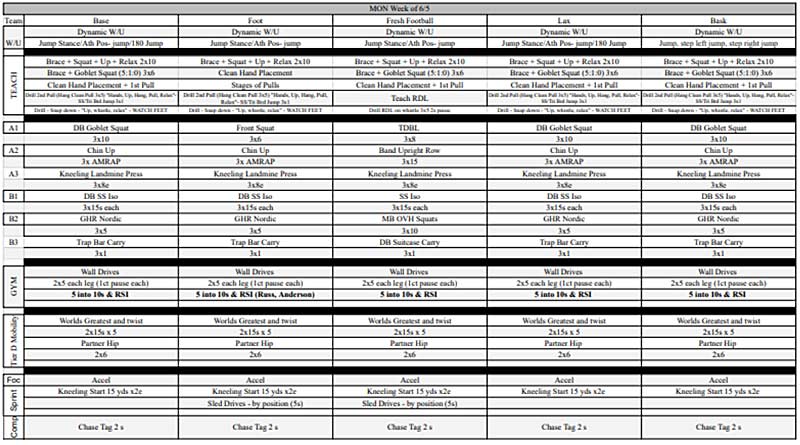
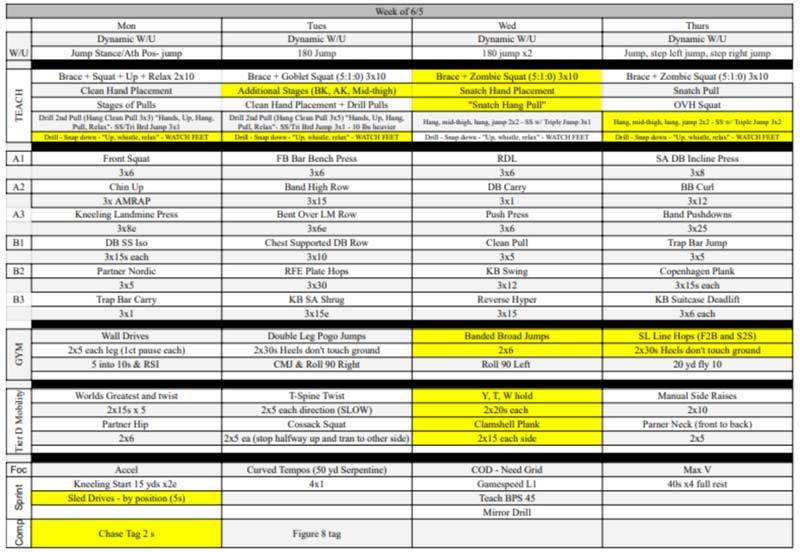
Since you’re here…
…we have a small favor to ask. More people are reading SimpliFaster than ever, and each week we bring you compelling content from coaches, sport scientists, and physiotherapists who are devoted to building better athletes. Please take a moment to share the articles on social media, engage the authors with questions and comments below, and link to articles when appropriate if you have a blog or participate on forums of related topics. — SF

